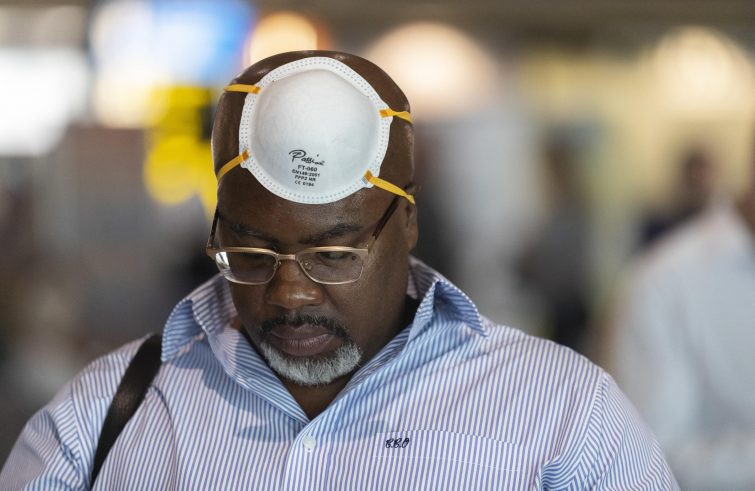
On the morning of Wednesday 18 March, Africa reported 476 cases of coronavirus. The African continent has limited means to cope with a potential epidemic owing to weak health systems with limited resources. However, the number of cases is still small, although perhaps underestimated. Some Countries, which are better organized due to their experience with Ebola, are preparing to test foreign travellers. Tanzania and the Central African Republic reported their first cases, connected with Italians travelling to the two countries. We discussed the situation with Don Dante Carraro, director of Doctors with Africa CUAMM, recently returned from South Sudan.
 Is the number of detected cases realistic?
Is the number of detected cases realistic?
This morning, there were 476 confirmed cases of Covid-19 coronavirus in 31 African countries affected by the epidemic so far, 59 more than yesterday, 10 dead and 47 recovered, which is still a low number considering that it refers to the whole of Africa.
Today Somalia confirmed the first case of Coronavirus.
The country is so insecure that the only information comes from the World Health Organization, there are no NGOs present at local level. Suspicious cases are generally not considered in Africa. Any African country will wait for a diagnosis before announcing a confirmed infection. Therefore these numbers may be underestimated because the diagnostic capacity is still poor. On Saturday morning, a patient in the hospital in Wolisso, Ethiopia, with suspicion of coronavirus infection, was admitted to the isolation ward we set up. The clinical and radiological picture indicated a coronavirus infection, but the situation improved with antibiotic therapy, so coronavirus positivity was excluded.
What’s the situation like in the Countries where you carry out your activity?
Ethiopia, Tanzania and the Central African Republic have confirmed cases of coronavirus. The first reported cases in the latter two countries, one per country, are linked to Italians.
In the Central African Republic in particular, the first case involves a missionary returning from the Veneto region in February, when restrictive measures had not yet been taken. I can imagine how sorry he must feel, we don’t want to aggravate the situation of countries that are already weak. But unfortunately it can happen regardless of how cautious we are. The case was detected two days ago. We wish him a full recovery and, since he is a known person, we hope that it will be easy for authorities to identify all the contacts he had. For the time being, it remains the only known case in the Central African Republic.
In Ethiopia, however, the first case was linked to Asia; one more case was confirmed during the night, reportedly in the capital. But little is known about the second case, which has just been reported. However, Ethiopia is reacting very well: the people with whom the infected person had contacts have already been identified and placed in isolation. With almost 120 million inhabitants, the Country is on high alert. Local authorities are working with us to identify the cases and to contain the outbreak. Furthermore, over the past hours we have been actively supplying 23 hospitals with the protective equipment required: face masks, gloves, alcoholic gel, hospital gowns, in the most appropriate ways. Various healthcare centres, where especially-equipped rooms were set up during the Ebola epidemic, have a separate area for suspicious cases, in order to avoid contagion to other patients admitted to the hospital.
What are the possible scenarios if the virus spread across Africa?
We are worried because
given the weak health systems, in case of a major outbreak the risk of a carnage is high:
in Africa we lack personnel, equipment, proper medicines, diagnostic skills. And we still know very little about this virus. For example, there is a debate on how it responds to high temperatures. No one knows, of course, but the hope is that it will weaken with high temperatures. South Sudan, from where I have just returned, is extremely hot and no case has been confirmed so far in the capital or in rural areas. We are working in five hospitals and we monitor the situation. Juba, the capital city, is well organized: after disembarking, passengers must line up, fill in a form with their personal data and where they departed from, they must declare if they have symptoms, and their temperature is checked. Those with fever are place under quarantine and must wait and see how the disease evolves. People coming from non-at risk countries can enter South Sudan, those like myself arriving from Italy are registered on an IT card with their phone numbers. Every day I was there they would call me in the morning to ask if I had a fever or other symptoms. The spread of Ebola has helped these countries become better prepared in case of an emergency: the staff is trained, screenings are conducted with thermometers and thermal scanners, people know how to use them. During the Ebola epidemic they registered millions of travellers’ cards. I must say that the situation as a whole, at least with a view to identifying suspicious cases, is good and well organized. It’s always possible for a case to go undetected and thus be difficult to diagnose. In the five hospitals where we work in South Sudan there is no functioning radiology department. And not one ICU in the whole country.
That’s why all efforts focus on prevention. If the virus were to spread in South Sudan like it did in Europe it would be a tragedy. In sub-Saharan Africa Ghana has a good health care system, in the capital of Nigeria there are some small intensive care units, but in other countries, including the capital cities, hospitals rarely have intensive care, and when they do there are just 4 or 5 beds.
What other measures are the various African governments taking?
As previously mentioned, after the first 4 cases Ethiopia closed schools and universities nationwide and has taken measures for travellers like those of South Sudan. Of course, it’s difficult to compare Ethiopia with the Central African Republic, whose entire rural part of the country, with armed groups circulating, is beyond control. Tanzania, on the other hand, is keeping the situation under control. There has been no civil war, core staff is sufficiently trained and even CUAMM Doctor Giovanni Torelli, working with the country’s crisis unit against the epidemic, informed me that strict control measures are in place for incoming travellers similar to those adopted in South Sudan.
What is the message from CUAMM?
In this difficult situation, our commitment as Doctors with Africa CUAMM is to be near them, to share their fears and make the most of our intellectual and scientific skills, along with our full dedication to face this emergency together.










